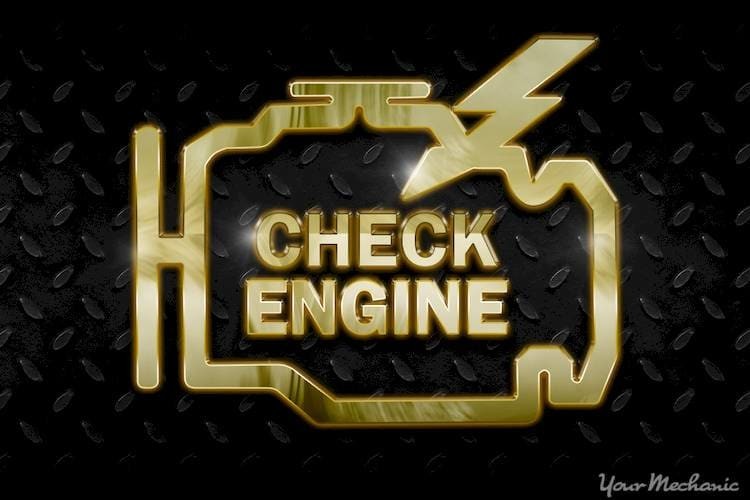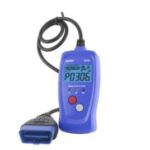 Check Engine Light illuminated on a car dashboard, indicating a potential engine problem and the need for diagnostics, possibly related to an OBD-II P0263 code.
Check Engine Light illuminated on a car dashboard, indicating a potential engine problem and the need for diagnostics, possibly related to an OBD-II P0263 code.
The P0263 fault code is a diagnostic trouble code (DTC) defined by the EOBD/OBDII standards as Cylinder Number 1 Contribution/Balance Fault. This code is triggered when your vehicle’s Engine Control Module (ECM) detects that cylinder number 1 is not contributing effectively to the engine’s overall power and smooth operation. In simpler terms, it means cylinder 1 is producing less power compared to the other cylinders.
Understanding the P0263 Code Meaning
When the ECM logs a P0263 code, it signifies that there’s an imbalance in power contribution from cylinder 1. The engine’s computer constantly monitors the crankshaft speed. During each cylinder’s power stroke, the crankshaft should accelerate slightly. If the ECM doesn’t detect the expected acceleration from cylinder 1, it interprets this as a lack of contribution, leading to the P0263 code. This issue points to a potential problem within cylinder 1 that is hindering its ability to generate sufficient power.
Common Causes of a P0263 Code
Several factors can lead to a P0263 code. These can range from fuel delivery problems to mechanical issues within the engine itself:
- Faulty Fuel Injector: The most common culprit is a malfunctioning fuel injector in cylinder 1. This could mean the injector is clogged, delivering insufficient fuel, or completely failed, delivering no fuel at all.
- Injector Electrical Issues: While less common for P0263 alone, electrical problems like an open or short circuit in the injector wiring can also cause this code. Usually, these electrical faults will trigger additional, more specific injector codes.
- Low Fuel Pressure or Volume: Inadequate fuel supply to the engine can affect all cylinders, but it might manifest more noticeably in cylinder 1. A clogged fuel filter or a failing fuel pump can lead to low fuel pressure.
- Low Cylinder Compression: Mechanical problems within cylinder 1, such as worn piston rings, valve issues (rockers, lifters, camshaft), or a damaged cylinder head gasket, can result in low compression. Low compression directly translates to reduced power output from that cylinder.
- Leaking Injector O-Rings: If the O-rings sealing the fuel injector to the intake manifold are damaged or worn, they can leak compression. This leak can reduce cylinder pressure and contribute to a P0263 code.
Symptoms Associated with the P0263 Code
The symptoms of a P0263 code can vary in severity depending on the underlying cause. Common symptoms include:
- Check Engine Light: The most obvious symptom is the illumination of the Check Engine Light on your dashboard.
- Rough Engine Idle: The engine may idle roughly or unevenly due to the power imbalance.
- Engine Misfire: You might experience a noticeable engine misfire, which can feel like jerking or stumbling, especially during acceleration.
- Reduced Engine Power: Overall engine performance may be reduced, leading to sluggish acceleration and decreased power, particularly under load.
- Poor Fuel Economy: The engine might compensate for the misfire by using more fuel, resulting in decreased fuel efficiency.
- Black Smoke (in some cases): If the issue is low compression and causing unburnt fuel to enter the exhaust, you might observe black smoke from the tailpipe. Conversely, a lean condition due to a faulty injector could also occur, though less likely to produce black smoke.
Diagnosing the P0263 Code: A Mechanic’s Approach
A professional mechanic will follow a systematic approach to diagnose a P0263 code:
- Code Scan and Freeze Frame Data: The mechanic will first use an OBD-II scanner to read all stored trouble codes and record the freeze frame data. This data provides a snapshot of engine conditions when the code was set.
- Code Verification: After documenting the codes, they will clear the codes and test drive the vehicle to see if the P0263 code returns. This confirms if the problem is still present.
- Injector Electrical Test: An injector electrical self-test can help determine if there are any electrical faults within the cylinder 1 injector circuit.
- Fuel Pressure and Volume Check: Fuel pressure and volume are tested to ensure the fuel delivery system is functioning correctly and providing adequate fuel to the engine.
- Crankcase Pressure Test: A crankcase pressure test can help identify excessive pressure, which might indicate internal engine issues contributing to the problem.
- Cylinder Compression Test: A cylinder compression test is crucial to assess the mechanical health of cylinder 1. Low compression readings point to internal engine problems requiring repair.
- Injector O-Ring Inspection: The mechanic will inspect the injector O-rings for leaks. If leakage is found, injector replacement might be necessary.
Common Diagnostic Mistakes to Avoid
To ensure accurate diagnosis and repair, mechanics must avoid these common mistakes:
- Skipping Code Verification: Failing to verify that the code returns after clearing it can lead to misdiagnosis if the issue was intermittent.
- Ignoring Fuel Pressure: Directly replacing the injector without first checking fuel pressure and volume can be a mistake. Low fuel pressure can mimic injector problems and should be ruled out first.
Severity of the P0263 Code
The P0263 code should be considered a moderately serious issue. While it might not immediately cause catastrophic engine failure, a persistent misfire and power imbalance can lead to:
- Catalytic Converter Damage: Unburnt fuel entering the exhaust system due to a misfire can overheat and damage the catalytic converter over time.
- Increased Emissions: A misfiring cylinder increases harmful emissions.
- Reduced Drivability: Poor engine performance and rough running can significantly impact the driving experience.
Repairs to Fix the P0263 Code
The necessary repairs for a P0263 code depend entirely on the root cause identified during diagnosis. Potential repairs include:
- Fuel Injector Replacement: If the injector is faulty, replacing the cylinder 1 fuel injector and its seals is the most common repair.
- Fuel System Repairs: Addressing issues like a clogged fuel filter or a failing fuel pump by replacement.
- Engine Mechanical Repairs: Repairing internal engine components to restore proper cylinder compression. This could involve valve work, piston ring replacement, or cylinder head gasket repair, depending on the specific issue.
Additional Considerations for P0263
Remember that the P0263 code specifically points to a contribution issue in cylinder 1. While injector problems are frequent, a thorough diagnosis is essential to rule out other potential causes like compression issues or fuel delivery problems. In some cases, if the injector is electrically shorted or open, you might encounter additional diagnostic trouble codes alongside P0263, further indicating an injection system fault.
If you are encountering a P0263 code, it is recommended to seek professional diagnosis and repair to ensure the problem is correctly identified and resolved, restoring your vehicle’s engine performance and reliability.

